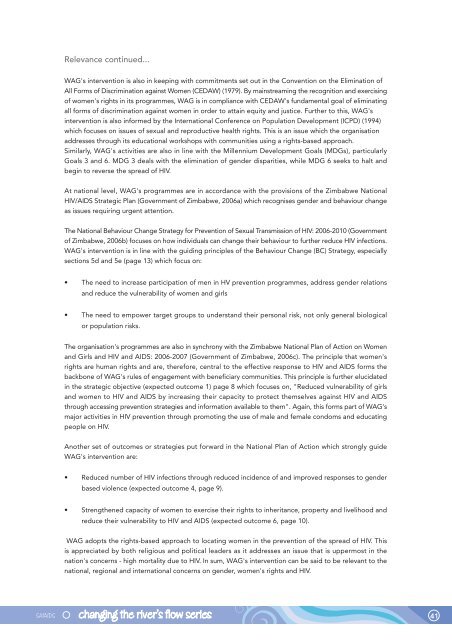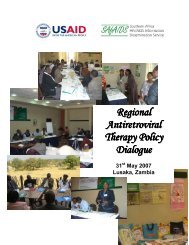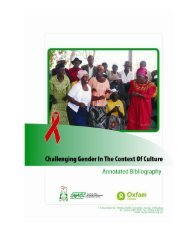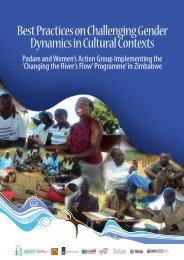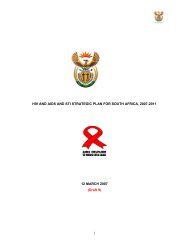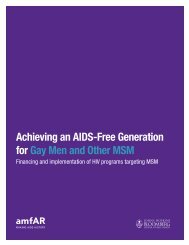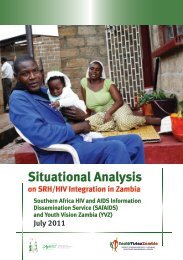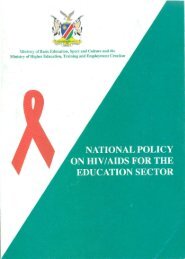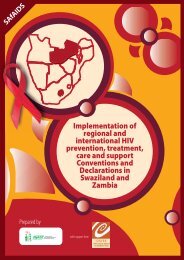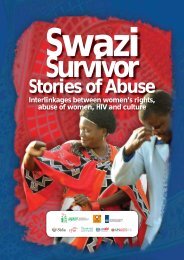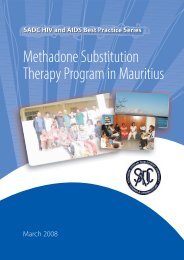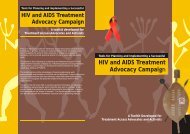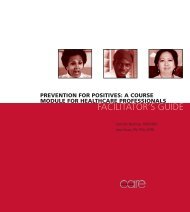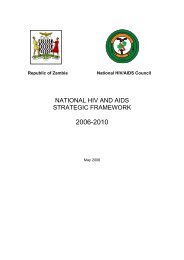Zimbabwean stories of "Best Practice" - SAfAIDS
Zimbabwean stories of "Best Practice" - SAfAIDS
Zimbabwean stories of "Best Practice" - SAfAIDS
Create successful ePaper yourself
Turn your PDF publications into a flip-book with our unique Google optimized e-Paper software.
Relevance continued...WAG's intervention is also in keeping with commitments set out in the Convention on the Elimination <strong>of</strong>All Forms <strong>of</strong> Discrimination against Women (CEDAW) (1979). By mainstreaming the recognition and exercising<strong>of</strong> women's rights in its programmes, WAG is in compliance with CEDAW's fundamental goal <strong>of</strong> eliminatingall forms <strong>of</strong> discrimination against women in order to attain equity and justice. Further to this, WAG'sintervention is also informed by the International Conference on Population Development (ICPD) (1994)which focuses on issues <strong>of</strong> sexual and reproductive health rights. This is an issue which the organisationaddresses through its educational workshops with communities using a rights-based approach.Similarly, WAG's activities are also in line with the Millennium Development Goals (MDGs), particularlyGoals 3 and 6. MDG 3 deals with the elimination <strong>of</strong> gender disparities, while MDG 6 seeks to halt andbegin to reverse the spread <strong>of</strong> HIV.At national level, WAG's programmes are in accordance with the provisions <strong>of</strong> the Zimbabwe NationalHIV/AIDS Strategic Plan (Government <strong>of</strong> Zimbabwe, 2006a) which recognises gender and behaviour changeas issues requiring urgent attention.The National Behaviour Change Strategy for Prevention <strong>of</strong> Sexual Transmission <strong>of</strong> HIV: 2006-2010 (Government<strong>of</strong> Zimbabwe, 2006b) focuses on how individuals can change their behaviour to further reduce HIV infections.WAG's intervention is in line with the guiding principles <strong>of</strong> the Behaviour Change (BC) Strategy, especiallysections 5d and 5e (page 13) which focus on:• The need to increase participation <strong>of</strong> men in HV prevention programmes, address gender relationsand reduce the vulnerability <strong>of</strong> women and girls• The need to empower target groups to understand their personal risk, not only general biologicalor population risks.The organisation's programmes are also in synchrony with the Zimbabwe National Plan <strong>of</strong> Action on Womenand Girls and HIV and AIDS: 2006-2007 (Government <strong>of</strong> Zimbabwe, 2006c). The principle that women'srights are human rights and are, therefore, central to the effective response to HIV and AIDS forms thebackbone <strong>of</strong> WAG's rules <strong>of</strong> engagement with beneficiary communities. This principle is further elucidatedin the strategic objective (expected outcome 1) page 8 which focuses on, "Reduced vulnerability <strong>of</strong> girlsand women to HIV and AIDS by increasing their capacity to protect themselves against HIV and AIDSthrough accessing prevention strategies and information available to them". Again, this forms part <strong>of</strong> WAG'smajor activities in HIV prevention through promoting the use <strong>of</strong> male and female condoms and educatingpeople on HIV.Another set <strong>of</strong> outcomes or strategies put forward in the National Plan <strong>of</strong> Action which strongly guideWAG's intervention are:• Reduced number <strong>of</strong> HIV infections through reduced incidence <strong>of</strong> and improved responses to genderbased violence (expected outcome 4, page 9).• Strengthened capacity <strong>of</strong> women to exercise their rights to inheritance, property and livelihood andreduce their vulnerability to HIV and AIDS (expected outcome 6, page 10).WAG adopts the rights-based approach to locating women in the prevention <strong>of</strong> the spread <strong>of</strong> HIV. Thisis appreciated by both religious and political leaders as it addresses an issue that is uppermost in thenation's concerns - high mortality due to HIV. In sum, WAG's intervention can be said to be relevant to thenational, regional and international concerns on gender, women's rights and HIV.41


